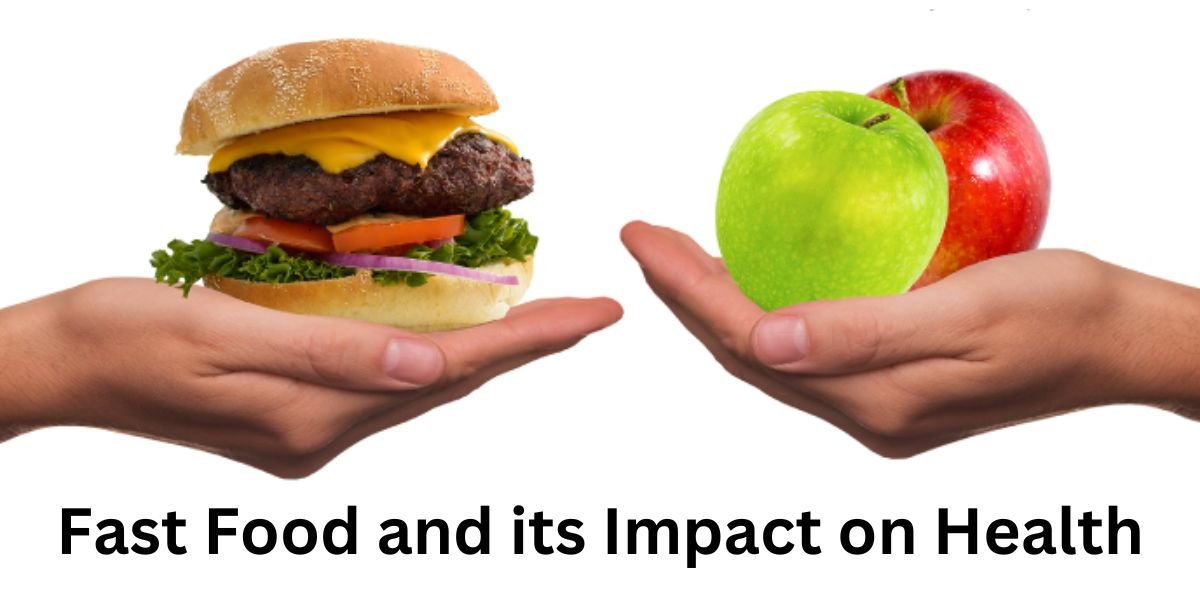In this fast world, fast food has become an important part of our diets. Its convenience, affordability, and availability have made it an easy option for millions of people around the globe. As the usage of fast food rises, it is important to know about its impact on our health.
What is fast food?
Fast food means all the foods that are prepared and served quickly, mainly at restaurants and takeaway outlets. These are designed to be prepared in less time. The concept of these foods have been known for centuries, but it gained popularity in the mid-20th century. Fast food companies offer a menu with items that are usually high in calories, fats, and sugars.
Some common examples of fast food include:
- Burgers and Fries: This combination contains high amounts of calories and unhealthy fats. A normal cheeseburger with fries contains approximately 800 calories.
- Pizza: It is often loaded with cheese, processed meats, and refined flour. Only one slice of pizza has approximately 300 calories.
- Fried Chicken: A single piece of fried chicken approximately contains more than 400 calories.
- Sugary Drinks and Desserts: Sodas, milkshakes, and desserts like ice cream are commonly served with fast food, which increase the amounts of sugar and calories. A large soda contains over 200 calories.
The nutritional value of fast food is poor. Fast foods are high in fats, sugars, sodium, and refined carbohydrates. While low-saturated fats include fiber, vitamins, and minerals.
Impact of Fast Food on the Physical Health
The regular usage of fast food can cause serious problems for physical health. The high calorie content combines with poor nutrition and causes a wide range of health problems.
Obesity and Weight Gain
The most direct impact is obesity and weight gain. The obesity rate is increasing with high ratios of fats, and fast food is the reason for this. The high-calorie food means a single meal of it can exceed the daily calorie intake.
- Caloric Surplus: Consuming more calories on a daily basis than the body needs leads to a caloric surplus. A single meal of burgers contains 800 to 1500 calories, so it is clear how it leads to weight gain.
- Portion Sizes: Fast food portions have grown with time, and super-sized options are becoming normal, which leads to overeating and then causes obesity.
Cardiovascular Diseases
High levels of unhealthy fats and sodium present in fast food are major reasons for cardiovascular diseases. These heart diseases include hypertension and strokes.
- Unhealthy Fats: Some fats are present in junk food items. It increases bad (LDL) cholesterol levels and lowers the good (HDL) cholesterol levels. This imbalance can block the arteries, which increases the risk of heart attacks and strokes.
- High Sodium: The high sodium amount in fast food can cause high blood pressure and many risks for heart diseases.
Type 2 diabetes
The intake of fast food can cause high risk of type 2 diabetes. This happens due to high levels of refined carbohydrates, sugars, and unhealthy fats that are present in fast food.
- Insulin Resistance: Daily intake of fast food with high sugars and high fats can lead to insulin resistance. It is a condition in which the cells of a body cannot properly respond to insulin. With time, it can cause type 2 diabetes.
- High Glycemic Index: Many junk food items like bread buns, fries, and sugary beverages contain high glycemic index. This high index increases blood sugar levels, which can increase the risk of diabetes.
Impact of Fast Food on Mental Health
The impact of fast food on mental health is very dangerous. Diet and mental health can cause mood swings.
Depression and Anxiety
Some research suggests that diets like junk food are causing a great risk of depression and anxiety.
- Nutrient Deficiencies: junk food is low in essential nutrients like omega-3 fatty acids, vitamins, and minerals, which are important for brain health. Lack of these nutrients can lead to imbalances in neurotransmitters, which cause mood disorders.
- Inflammation: Diets high in unhealthy fats and sugars can increase inflammation in the body, which is directly linked to depression and other mental health issues.
Cognitive Decline
The regular use of junk food may cause cognitive decline and an increased risk of neurological disease like Alzheimer’s.
- Oxidative Stress: The high levels of unhealthy fats and sugars in junk food can increase oxidative stress. It can damage the brain cells.
- Memory and Learning: Some studies have proved that junk food can impact memory and learning abilities. This occurs especially in young individuals whose brains are in the developing stage.
The Broader Societal Impact of Fast Food
The fast food has not only impacted individual health but also affects society as a whole. It causes problems for public health and environmental issues.
Public Health Issues
The frequent consumption of junk food is a risk to global public health. The increased number of diseases like obesity, type 2 diabetes, and cardiovascular diseases is becoming a burden on worldwide healthcare systems. Treatment of these conditions requires high medical resources and costs, which are not provided by developing countries.
- Healthcare Costs: The treatment of diseases like heart disease and diabetes that are caused by diet is expensive. It leads to an increase in healthcare costs for the government.
- Productivity Loss: Poor health can cause low productivity and illness. This effects the economy of a society.
Environmental Impact
The production, packaging, and disposal of fast food have many environmental problems.
- Resource Consumption: The production of junk food, mainly meat products, requires a large amount of water, land, and energy.
- Packaging Waste: junk food is normally given in disposable packaging, which is made of non-biodegradable materials like plastic. This can cause plastic pollution.
Addressing the Impact of Fast Food on Health
Now we know about the impact of junk food on health, it is important to take some precautions to minimize these effects. These problems can be solved when the government and food industry come on the same page.
Individual Responsibility
Individuals can take some steps to reduce their intake of junk food and improve their health:
- Healthy Eating Habits: Everyone should give priority to foods like fruits, vegetables, lean proteins, and whole grains. Preparing meals at home to develop healthy eating habits.
- Education and Awareness: Public health campaigns can play an important role in raising awareness about the damages of excessive fast food consumption.
Conclusion
The consumption of fast food is very convenient and affordable, but it increases the risks of obesity, chronic diseases, and mental health issues. Moreover, the impact of fast food on the environment disturbs society. To address these issues, we require a collective effort of individuals, governments, and the food industry. By doing this, we can minimize the impact of fast food on our health.






